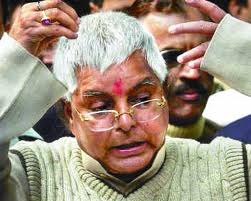
Patna, September 9: Rashtriya Janata Dal chief Lalu Prasad Sunday said Bal Thackeray, Uddhav Thackeray and Raj Thackeray were originally Bihari, and that they were "infiltrators" in Maharashtra.
"Thackeray's family are originally from Bihar and now settled in Maharashtra. They are infiltrators in Mumbai, they should leave Maharashtra as soon as possible," Lalu told newspersons here while reacting sarcastically to Raj Thackeray's remarks over the issue of Bihari "infiltrators".
Lalu, former chief minister and central minister, said this country belongs to all and every one is free to visit, stay and work anywhere within the country, whether Mumbai, Delhi, Chennai or Bangalore.
"Biharis are contributing to building Maharashtra by working hard. They are neither harming its interest not creating any trouble, they have full right to stay there," Lalu said.
Lalu said the Thackerays have always been indulging in a campaign against North Indians, mostly Biharis. He added that Bihar Chief Minister Nitish Kumar had failed to counter the Thackerays. "Nitish Kumar is like a parrot of the Thackeray family," Lalu said, taking a dig at the chief minister.
Lalu recalled that when Nitish Kumar went to Mumbai to address the Bihar Diwas celebrations in April this year, he hardly spoke about Bihar, although he praised Maharashtra. Last week, Congress general secretary Digvijay Singh took on the Thackerays, quoting from a book authored by Raj Thackeray's grandfather, Prabodhankar Thackeray, to show that the Thackeray family had its origins in Magadh, Bihar, and later moved to different cities in search of livelihood, like many modern migrants.





Comments
Add new comment